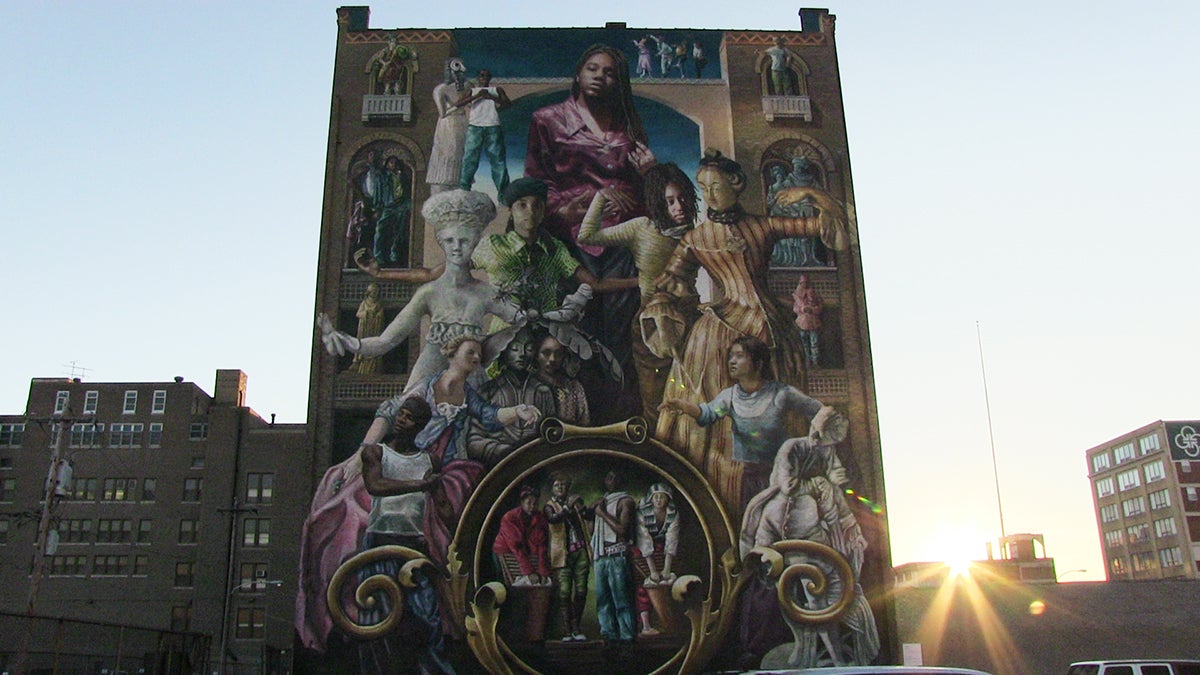One father’s story of staying in an imperfect Philadelphia

'Common Threads,' by Meg Saligman at Broad and Spring Garden Streets, Philadelphia. (Solomon Jones/ for Newsworks)
Nearly two years ago when I began writing “The Philadelphia Experiment,” I was determined to find the good in Philadelphia.
Since then, I’ve watched 24 schools close in the city’s most vulnerable neighborhoods. I’ve seen T-shirt memorials that starkly illustrate the tragedy of the city’s gun violence. I’ve seen the state ignore a $304 million school-budget crisis in Philadelphia while investing $400 million in a Montgomery County prison.
There is much that is ugly about the Philadelphia story.
The rabidly provincial nature of our neighborhoods divides us into something like gangs.
The almost inconceivable level of government bureaucracy creates barriers against common sense.
Our underdog mentality is two steps short of an inferiority complex.
And yet, despite all I’ve seen in my four-plus decades in this city, I love Philadelphia as fiercely as ever.
Why I love Philly
I love it because birds arrive at dawn to sing of our urban landscape.
I love it because tree-lined sections of North and West Philadelphia comprise the largest urban park in the world.
I love it because rivers flow along our borders, because hills rise and fall in our streets, and because children play in fountains in the shadows of City Hall.
Still, my love for our city prevents me from seeing it through rose-colored glasses.
Love, after all, is not about viewing things for what we wish them to be. Love is about viewing things for what they are.
Why we stay
That’s why I’ve chosen to raise my children here, in a place as flawed and imperfect as Philadelphia. I want them to see life for what it is.
I don’t want them to sit in some cloistered suburb where they are made to believe that life is a Norman Rockwell painting.
I don’t want them to believe that economic and racial homogeneity is the reality they should come to expect.
I don’t want them to believe that the city is the violent horror show that they see on the news.
I want them to interact with people who don’t look exactly like us. And converse with people who don’t think exactly like us. And be encouraged, yet challenged, protected, yet informed, wise, and yet courageous.
I want them to be Philadelphians.
Steeped in reality
This means they will occasionally see the ugly truth of racism wrapped up in the low expectations of others. It means they’ll see poor neighborhoods redeveloped, but rarely for the benefit of the poor. It means they’ll see the elderly disowned and disrespected. It means they’ll see the young cast aside. It means they’ll see their own Philadelphia story in real life.
But, real life isn’t defined simply by what others do to us. Real life is defined by what we do for ourselves, for each other and even for those we don’t know.
In Philadelphia, we have a choice.
We can see the shootings, rapes and murders that are highlighted in newscasts, and tell ourselves there’s nothing to be done.
We can let others define our city and tell ourselves they know better than we do.
We can see our city through the lens of hopelessness and cower in fear of the inevitable.
Or, we can do something.
I’m raising my children in the city I love because I want them to be the kind of people who do something.
If the community around them is hurting, I don’t want them to curse the darkness. I want them be the light.
If the poor are disenfranchised, I don’t want my children to talk about the injustice. I want them to create solutions.
If job opportunities are drying up, I don’t want my children to denigrate the unemployed. I want them to help them find livelihoods.
I remain in Philadelphia not because it is perfect, but because it is not. That imperfection has given me opportunities to work on behalf of others. It has allowed me to grow as a man.
My hope is that Philadelphia will offer those same opportunities to my children. More importantly, my hope is that my children will take them.
More at Jones’s website
WHYY is your source for fact-based, in-depth journalism and information. As a nonprofit organization, we rely on financial support from readers like you. Please give today.


